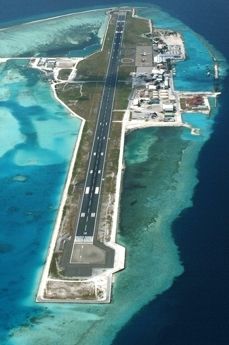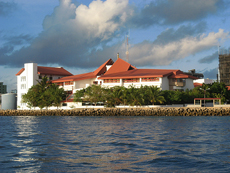Six people have died in reported suicides so far this year.
The first case was reported on January 7. A 39 year-old woman from Kinolhas in Raa Atoll died after consuming a poisonous substance.
On May 21, a 26 year-old Indian teacher working on Eydhafushi island of Baa Atoll hanged himself.
On June 18, a young man aged 20 committed suicide by ingesting poison at the resort he worked.
In the latest three suicides, cases reported almost a week from each other, three men took their lives by hanging themselves.
Meanwhile, several more disturbing suicide attempts and self-inflicted injuries have also been reported, including one incident involving a woman who jumped into the water holding her five year-old child. Fortunately, the pair were rescued by bystanders.
According to Global School Health Survey of Maldivian students published in 2009, 19 percent of the those surveyed said they had “seriously considered attempting suicide”. A further 22 percent of these said they had made a plan on how to do it.
These scary figures are just a few among the many warnings underscoring the high prevalence of mental health woes and suicide risk factors among young people in the Maldives.
But, authorities have been to slow to recognise the problem.
In 2001 only a single suicide case was recorded in the Maldives, while over the years the rates of reported suicides have jumped as high as 14 in 2007, 13 cases in 2011 and five last year. Suicide statistics have not been maintained by the police or any authority consistently, and more cases are likely to go unreported or undetected.
Speculating on causes
Anecdotal evidence suggest that most suicides or self-inflicted injuries among young people stem from bullying or neglect, according to medical officer at the Health Protection Agency, Dr Fathmath Nazla Rafeeq. She also cited a a potential correlation between suicide and drug use.
“We know that drug use in Maldives is much higher compared to even places such as Afghanistan. Research show that drug use can cause severe mental health problems among long term addicts. Drug use hampers a person’s capacity to cope with stress and due to that some people take their own lives.” Dr Nazla explained. Therefore, she said current drug rehabilitation programs already focus on dual diagnosis: providing rehabilitation and psychosocial support.
She also adds that urbanisation, congestion and unemployment in developing countries is believed to contribute to suicide rates, and suggested a similar pattern was emerging in the Maldives.
Over the years, people from remote islands have moved to the capital city Male’ resulting in uncontrolled urbanisation and overcrowding. One third of the Maldives’ 350,000 population lives in the capital while the rest is scattered in small island communities, some as small as 500 people. Unemployment is also widespread among young people.
Meanwhile, extended families are being replaced with small separate nuclear families due to poor housing conditions and other demographic changes, according to Dr Nazla.
“This definitely impacts relationships within homes and can have a detrimental effect on emotional well-being of people, especially children,” she observed.
However, she says it is difficult to ascertain specific reasons behind suicides in Maldives, as no studies have been so far conducted into understanding the prevalence of suicides or what causes it.
She also acknowledged the slow pace of expanding a structured mechanism to provide psycho-social support, despite evidence of high risk suicide factors.
“We are able to provide free medication to people with chronic mental illnesses. But, when it comes to normal people with mental health problems who sometimes need support such as counselling, we have very limited public support system – especially on the islands,” she noted.
According to Dr Nazla, the psychiatric centre at the state-run hospital IGMH is frequently overbooked and Family and Children Centres run by the Gender Ministry on remote islands respond only to cases of abused women and children, with little direct oversight from the health ministry.
As suicides are most frequent among young men and expatriate workers, she also pointed out the need for specific programs targeting these vulnerable groups.
Therefore, she says, talks are in progress with World Health Organisation (WHO) to conduct a joint study into understanding the prevalence of chronic mental health illnesses and various emotional health problems in the Maldives, and what can be done to expand mental healthcare facilities.
Understanding suicidal behaviour will be a major component of the study, Dr Nazla says.
However, she argued that best way to prevent suicides comes from strengthening relationships.
“Parents should be able to have honest conversations with children to let them know that they are always there to help. It is also very important for married couples and close friends to have open discussions and build trust.”
Stigma and silence
Though openly speaking about suicidal tendencies is considered a way of stopping it from happening, it is easier to be said than done.
The Maldives is constitutionally a 100-percent Muslim country and it is common belief that suicide is one of the religion’s biggest sins, akin to apostasy.
At the same time no legal penalty exists for survivors of suicide attempts under the Sharia-common law system in the Maldives, as opposed to many countries which have criminalised suicide.
But the sting of stigma that emerges in the wake of a suicide is far from forgiving. And it is the suicide victim’s family that bears the brunt.
A young woman who lost her 18 year-old sister to suicide, shared an account of the disturbing experience she and her family endured following her death.
“My sister was a very happy outgoing girl and her performance in school was outstanding. We don’t know till this day why she killed herself,” she said.
“Society didn’t even give us a chance to mourn her death in peace. When we took her body to the graveyard, no one wanted to join in for funeral prayer and we weren’t allowed to take her body inside the mosque. We had to bury her body far away from other graves because [graveyard staff] didn’t allow it,” she recalled.
“People said by committing suicide my sister had become an apostate. She is no longer a Muslim, so she cannot be buried near others.”
For months her family was tormented by neighbours and journalists swarming into the house.
“I was just 13 then. People stopped me on street to ask how my sister killed herself. What was she wearing. They kept asking if she pregnant, and was it related to a boyfriend problem,” she remembered. “There was no sympathy and people jumped to the worst conclusions in the most insensitive way possible.”
“I almost quit school too. My Islam teacher made me play hangman in class just few days after my sister’s death. She kept saying my sister would keep repeatedly dying in hell like this for eternity,” she recalled.
She says her family received no psychological support.
“My family coped with my sister’s suicide by erasing her from our lives. They pretend she never existed. My parents and siblings never talk about her.”
Promoting suicides
While families cope with suicide tragedies by keeping silent, some media organisations have also chosen not to report suicide incidents including public broadcaster TVM.
However some incidents are impossible to ignore – such as the case of the 25 year-old air traffic controller Ismail Mohamed Didi, who was found hanged from the air traffic control in July 2010.
Studies of suicide and the media in other countries have shown a pattern between careless coverage and ‘copycat’ attempts – sometimes leading to a suicide epidemic. Many foreign press associations have guidelines for reporters, such as including contact numbers for people in need of help, and being careful not to use language such as ‘an unsuccessful suicide’ when covering a failed attempt.
Maldives Broadcasting Commission President Mohamed Shaheeb said that during his time working as a journalist, suicide cases were rejected as “low-profile and not newsworthy”.
“This had nothing to do with religion”, Shaheeb said, stating that main reason for this practice was fear of “promoting suicides”.
“But news is news. Suicide is also news,” says Shaheeb. “When it is reported people know that it has happened. So there is no problem in reporting it. But personally I don’t believe a suicide should be reported every time, for example each time a Bangladeshi or Indian kills themselves. Unless it is a high-profile [victim], reporting it is unnecessary in my opinion,” he explained.
Ahmed Zahir, Editor of Sun Online, one of the few news websites reporting suicide incidents, disagrees.
He argued that reporting all suicides – Maldivians and expatriate – was necessary as these incidents helped to show “loopholes in society” forcing people to take such grave measures, and said such accounts can be useful for research purposes.
“Keeping silent definitely will not solve the issue,” Zahir said.
Likes (1)Dislikes
(1)Dislikes (0)
(0)  On December 8, the Transport and Communication Ministry revealed that it would finish drafting plans and begin the groundwork within a 100 days to develop the Ibrahim Nasir International Airport (INIA) to be able to cater to 5 million passengers.
On December 8, the Transport and Communication Ministry revealed that it would finish drafting plans and begin the groundwork within a 100 days to develop the Ibrahim Nasir International Airport (INIA) to be able to cater to 5 million passengers. held today that the government was drafting a policy to “bring major development to IGMH in a very short period of time to an extent never before seen”.
held today that the government was drafting a policy to “bring major development to IGMH in a very short period of time to an extent never before seen”. Maldives National Defence Force (MNDF)’s 100 day strategic plan includes the submission of various amendments to relevant laws – including the Armed Forces Act and Narional Security Act – to the parliament, and the establishment of a ‘justice system’ within the force.
Maldives National Defence Force (MNDF)’s 100 day strategic plan includes the submission of various amendments to relevant laws – including the Armed Forces Act and Narional Security Act – to the parliament, and the establishment of a ‘justice system’ within the force.